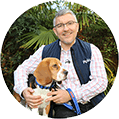Discover everything you need to know about keeping your golden oldie fit and happy, with our guide to helping senior dogs stay active.
As our dogs enter their senior years, they start to show signs of slowing down. But you can help your dog stay active for as long as possible by making some simple changes to their daily exercise routine. From deciding how much activity they should be getting to adapting their everyday walks, we’ve got plenty of advice on how to support an older dog’s fitness needs.
How much exercise does a senior dog need?
The precise answer to this will depend on your dog’s breed and their previous activity levels. Senior dogs can be affected by a range of age-related problems, including arthritis, deafness, vision impairments and heart conditions. These can all impact their ability to exercise in the way they did before.
It’s a good idea to get your vet’s advice on how to adapt your ageing dog’s routine to suit their individual needs. If you used to take your dog on three 20-minute walks a day, for example, you could consider dropping one walk, or decreasing the duration of each session. See how they respond and readjust as necessary. If you’re concerned about how much exercise is too much for a senior dog, it’s best to let them set the pace. If your dog seems very stiff or exhausted after an activity, or is showing signs of pain, they might be overdoing things.
It may take an older dog longer to recover from exercise, so make sure they have a quiet and comfortable place to rest when they get home. Placing water, food and toys close to their bed will ensure these are as easy to access as possible. Investing in a heated bed, or one with a thick orthopaedic base, can also help soothe your ageing dog’s joints.
What types of exercise are best for older dogs?
Before you introduce any new forms of exercise to your dog, it’s a good idea to take them for a health check. Your vet will look for signs of arthritis, obesity and other health conditions, and can also advise on what exercise may suit your dog best.
Generally, lighter forms of low-intensity exercise will suit older dogs. Long hikes and frenetic ball-chasing might no longer feature, but slow, gentle walks with lots of opportunities to stop and sniff the great outdoors will give your dog some valuable exercise, plus plenty of mental stimulation.
If available in your area, a canine hydrotherapy pool can help provide exercise while also protecting your dog’s joints and muscles. You could also take your dog for a dip at the beach or in a shallow, slow-flowing stream. If you’ve never taken your dog swimming before, speak to your vet first, as this form of exercise isn’t always recommended.

Don’t miss our Petplan advent calendar
See what treats are behind each door every day from 1st December until Christmas.
How can I adapt our walks as my dog gets older?
As your dog ages, it’s time to tailor their walkies to meet their new needs. Think about taking slower, shorter walks, with a break in the middle for a rest and a drink. If your dog’s hearing or sight is impaired, they may be slower to react to danger. Consider sticking to familiar routes, keeping them on the lead or going for walks somewhere that’s securely fenced.
Older dogs are also more susceptible to both heat and cold. During hot weather watch out for signs of overheating and avoid going out in the middle of the day. When it’s cold, your dog may appreciate a waterproof coat – or staying indoors and playing some gentle games instead!
Don’t forget to adjust your older dog’s diet
As your senior dog starts exercising a little less, they’ll burn fewer calories as a result. If you continue feeding them the same amount of food, this may cause them to become overweight. Canine obesity can create a range of problems, from making joint pain worse to increasing the risks of developing diabetes and heart disease. Ask your vet to check your dog’s body condition score and if your dog is overweight, you’ll need to slowly adjust their diet accordingly.
Exercise for senior dogs is essential for their mental and physical wellbeing. As your pet reaches their golden years, there’s no reason they can’t stay active and enjoy life – just at a slightly gentler pace!
If you’ve got any tips to share for keeping older dogs active, we’d love to hear them! Use the #PethoodStories tag on social media to join the conversation.

